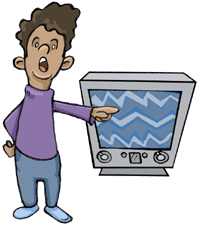Five Healthy TV Habits for Families
|
|
Creative tips for managing TV in your home.
Television has a strong influence on the lives of most American families. Here are five specific actions you can take to help your family members become more conscious about what they see and hear in the media -- and start on the path to media literacy
A. Instill the habit of watching specific programs, rather than just anything that happens to be on.
1. Train your child to ask to watch television before being allowed to turn it on, just like they have ask if they can go out to play or to go to someone's house. This gives you the opportunity to ask why and what they want to watch. It also gives you the opportunity -- and authority -- to consider other possible activities and to "check in" with your child.
2. Start early to get in the habit of turning the television off after a selected program is over. Many entertainment units have doors for the TV. So, when the program is finished, turn the TV off -- and close the door, just like we teach kids to put away their toys after they finish playing with them. If you don't have a door to close, find a colorful tablecloth or a drape and cover up the TV "so it can take a nap."
3. Use a TV program guide to select programs at the beginning of the week -- not only for your child -- but for yourself as well. Selecting your children's media may help you get into good TV habits as well. Find good shows for everyone to watch; good TV for children is usually good TV the whole family can enjoy!
B. Instill the habit of talking out loud to TV -- to express your point of view.
Challenge and question what you see and what you hear; encourage children to do the same.
1. Consider the TV a guest in the house, with ideas and opinions you may or may not agree with. That's OK, we don't agree with everyone. But we usually like to find out what people think before we decide if we want to spend time with them. If someone came to your door and asked to spend two or three hours alone with your children, it's not likely that you would say, "Swell, come on in!" and then walk out of the room leaving your children alone with them. Wouldn't you ask a few questions before you even let them in the door? Questions like:
Who are you and who sent you?
What do you want to tell my child? What kinds of words and pictures will your stories include?
What is your background/qualifications?
It's important to ask these same questions of the TV shows that come into your home.2. Once you've established that a TV program or a movie is a guest you want to spend time with -- then converse with the guest, just like you would a person. If an individual says something you disagree with, you challenge them right then! Use the commercial time to mute the TV and give you and your child a few minutes of "space" to talk about what's just been said on the program -- words -- visuals -- jokes -- messages about who's important? how women, minorities, the elderly, and disabled are treated?
-- Elizabeth Thoman, founder / Center for Media Literacy



